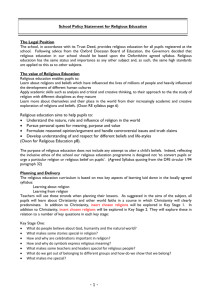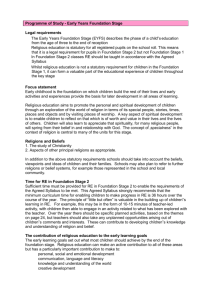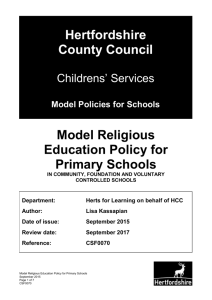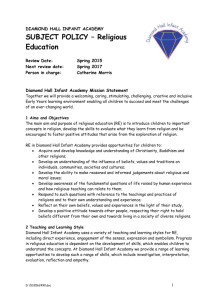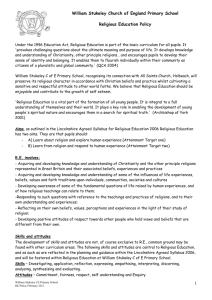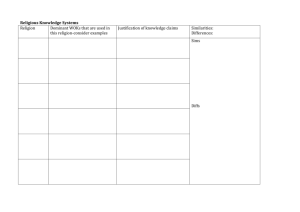Draft Religious Education policy
advertisement
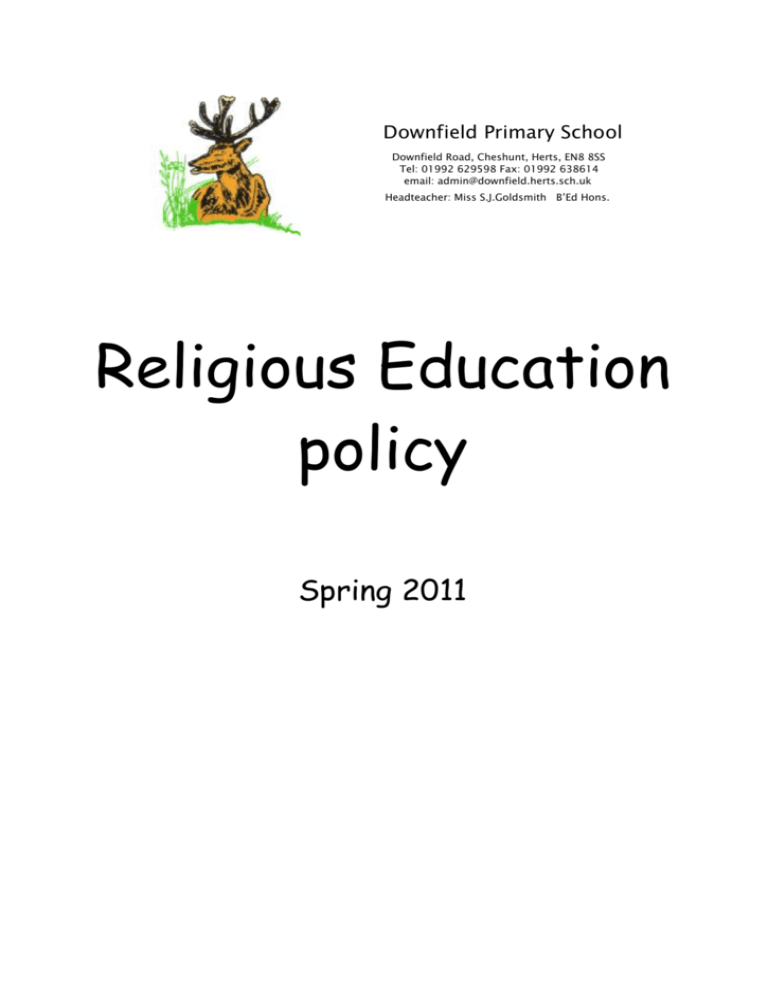
Downfield Primary School Downfield Road, Cheshunt, Herts, EN8 8SS Tel: 01992 629598 Fax: 01992 638614 email: admin@downfield.herts.sch.uk Headteacher: Miss S.J.Goldsmith B’Ed Hons. Religious Education policy Spring 2011 Background to Religious Education at our school Religious Education (RE) is not a National Curriculum subject, but must be taught to all pupils as part of the Basic Curriculum. As RE is not nationally determined the Local Education Authority must provide an Agreed Syllabus for us to follow. It is this Hertfordshire Agreed Syllabus of Religious Education 2006-2011 which we have used as the basis of our planning and delivery of RE. Families who send their children to this school are in the main ‘nominally’ Christian, but we do have some children from practising Christian families. In addition there are children who are from religions other than Christianity and some from non-religious backgrounds. RE is concerned with “learning about religions” and “learning from religion” and it is not the practice of this school to preach to or convert the children. The faith background of both the staff and the child’s family is respected at all times. Parents of a pupil at a community, foundation or voluntary school have a right to withdraw their children from religious education (RE). If a parent asks for their child to be wholly or partly excused from attending any RE the school must comply unless the request is withdrawn. Any parent, who wishes this, may consult the head teacher. Teachers may also withdraw from the teaching of RE. Values and Aims We believe at this school that RE both supports and strengthens what we aim to do in every aspect of school life. Our caring ethos and the value which we place on the development of the whole child; spiritually, morally, socially, culturally and intellectually is reflected in the RE curriculum. Specifically, RE at our school aims to enable pupils of whatever ability and level of development to: 1. Acquire and develop knowledge and understanding of principal world faiths practised in Great Britain. These include Buddhism, Christianity, Hinduism, Islam, Judaism and Sikhism, each of which is represented in Hertfordshire; 2. Develop an understanding of the influence of beliefs, values and traditions on individuals, communities, societies and cultures; 3. Develop the ability to make reasoned and informed judgements about religious and moral issues with reference to the teachings of the principal religions; 4. Enhance their own spiritual, moral, cultural and social development by: a. developing awareness of the fundamental questions of life arising from human experiences, and how religious beliefs and practices can relate to them; b. responding to the fundamental questions line of life in the light of their experience and with reference to religious beliefs and practices; c. reflecting on their own beliefs, values and experiences in the light of their study; d. expressing their own personal viewpoints in a thoughtful, reasoned and considerate way; 5. Recognise the right of people to hold different beliefs within a religiously diverse society. Objectives Learning In RE we foster a reflective approach to learning by encouraging an open and honest enquiry, awareness of prejudice, a growing selfunderstanding and respecting the rights of others to hold beliefs different from their own by Learning about Religions and Learning from Religion. These two attainment targets with their associated statements set out the broad objectives in terms of knowledge, understanding and skills for the RE curriculum. AT1 Learning about Religions Identify, name, describe and give an account, in order to build a coherent picture of each religion; Explain the meanings of religious language, stories and symbolism; Explain similarities and differences between, and within, religions. AT2 Learning from Religion Give an informed and considered response to religious and moral issues; Reflect on what might be learnt from religion in the light of personal beliefs and life experience; Identify and respond to the questions of meaning within religion. Children will be “Learning about Religions” and “Learning from Religion” through: 1. Investigation; the use of first-hand and other resources to understand religious people, objects, symbols, places, events, stories. 2. Questioning; developing curiosity about life, relationships and the natural world 3. Empathy; developing the power of imagination to identify feelings such as wonder, forgiveness, sorrow, joy and to try to see the world through the eyes of others 4. Reflection; the ability to consider thoughts, feelings, experiences, attitudes, beliefs of oneself and others 5. Relating; linking significant features of religions, making associations between them, to understand what makes religions distinct and/or similar 6. Expression; the ability to identify and explain feelings and aspects of religions Teaching Teaching the programmes of study should contribute to pupil’s knowledge and understanding and provide opportunities for reflection on six key areas. Belief and Teachings- e.g. stories, prophets, founders, books, God/gods, self-sacrifice, truth, life after death. Religious Practices and Lifestyles- e.g. people, festivals, pilgrimages, places, events, artefacts, lifestyle choices, effects on individuals Ways of Expressing Meaning- e.g. art, music, literature, symbolism, poetry, dance, drama, prayer, silence/stillness. Human Identity, Personality and experience- e.g. preferences, relationships within family and community, influences on own lives, inspirational people Questions of Meaning and Purpose- e.g. amazement, sadness, disappointment, joy, awe, in connection with the natural world and life’s journey, ultimate questions of life raised by life experiences. Values and Commitments- e.g. values, ethics, principles, rules, moral dilemmas. The teaching of RE seeks both to impart knowledge and develop understanding of religious experiences, feelings and attitudes through a variety of teaching and learning experiences. RE teaching specifically draws on the following: 1. Visits and visitors; enabling children to see at first hand religious people, objects, symbols, places, events, stories and explore with people who have faith 2. Role play; encouraging children to learn through familiar or unfamiliar settings and ask questions from their own encounters 3. Artefacts; being able to explore items which are precious and/or used in religious worship, encouraging respect whilst deepening knowledge 4. Parents; by valuing the family backgrounds of the children and making them part of the school community The teaching of RE will involve some direct teaching and whole class, group, paired or individual activities. A range of teaching styles will be used including enquiry, exploration, discussion, role play, drama, asking and answering questions, using a range of sources including ICT, works of art, artefacts, visits and visitors. Assessment, recording and reporting The agreed Syllabus sets out a structure for recognising pupil achievements and each pupil can work progressively towards achieving the statements of attainment as outlined following the Eight Level Scale in the Hertfordshire Agreed Syllabus for Religious Education. Assessment in RE is seen in its broadest sense and is not limited to measurement and testing. Through activities for example, discussion with pupils, group activities, marking and guiding their work, observing, displaying work, asking and answering questions, teachers are continually finding out about their pupils’ achievements. This information is then recorded on the medium term planning in line with other areas of the curriculum. At this school we appreciate that a vital aid to learning is for pupils to be actively involved in their own assessment. A copy of the Eight Level Scale has also been given to aid staff in their teacher assessment judgements. Planning In order to ensure that our aims are met and the Programme of Study is covered at each key stage the school follows the Primary Scheme of Work for RE which builds in coverage of and progression in both the content and concepts outlined in the Agreed Syllabus. This scheme shows how we have planned that aspects of all six principal faiths are explored over key stage one and two. We teach RE for three afternoons every term, on a two year rolling program in order to cover the six main faiths. Our medium term plans give details of each unit of work. The RE subject leader keeps and reviews these plans on a regular basis. We carry out the medium term planning on a two-year rotation cycle. By doing so, we ensure that children have complete coverage of the agreed syllabus but do not have to repeat topics. At the end of the unit, teachers carry out an evaluation highlighting successes and areas for development. These are kept in the medium term folder and are available for the co-ordinator to monitor. Short term planning of individual lessons is a matter for the class teacher. The RE co-ordinator is available to help with this and keeps a range of teacher’s resources as a guide. (When planning each unit of work the teacher will identify which parts of the programme of study are to be the focus, the learning objectives for the unit i.e. what the pupils should know, understand and be able to do as a result of their work; the activities planned to achieve them, time allocated and any resources, visits or visitors needed. The work planned must be relevant to the needs of the children. In line with the requirements of the Agreed Syllabus we plan to spend 30 hours per year at key stage one and 39 hours per year at key stage two on the teaching of RE. This is separate from the act of collective worship. Presentation Each unit of work will involve pupils in activities, such as already mentioned above (see sections on Teaching and Assessment). These will provide opportunities to demonstrate how far they have learned “about religions” and “from religion”. In addition, pupils will sometimes be encouraged to present work for a wider audience, such as in assembly (for the school and/or parents), or for display in the entrance area or hall. Pupils will need to think about the purpose of the work or its intended audiences before starting. Cross curricular issues RE teaching and learning will be the means to many wider crosscurricular themes and dimensions. There are clearly very special opportunities to explore multicultural and equal opportunities issues and a consideration of the environment. Moral questions will be raised and pupils will develop a sense of citizenship through many aspects of the explicit RE curriculum. Links will be made with people and communities within the locality. Children’s skills in oracy and literacy will be enhanced. Problemsolving, decision-making and interpersonal skills will be developed. Management and co-ordination The RE co-ordinator manages this area of the curriculum in line with our job description for subject co-ordinators.
